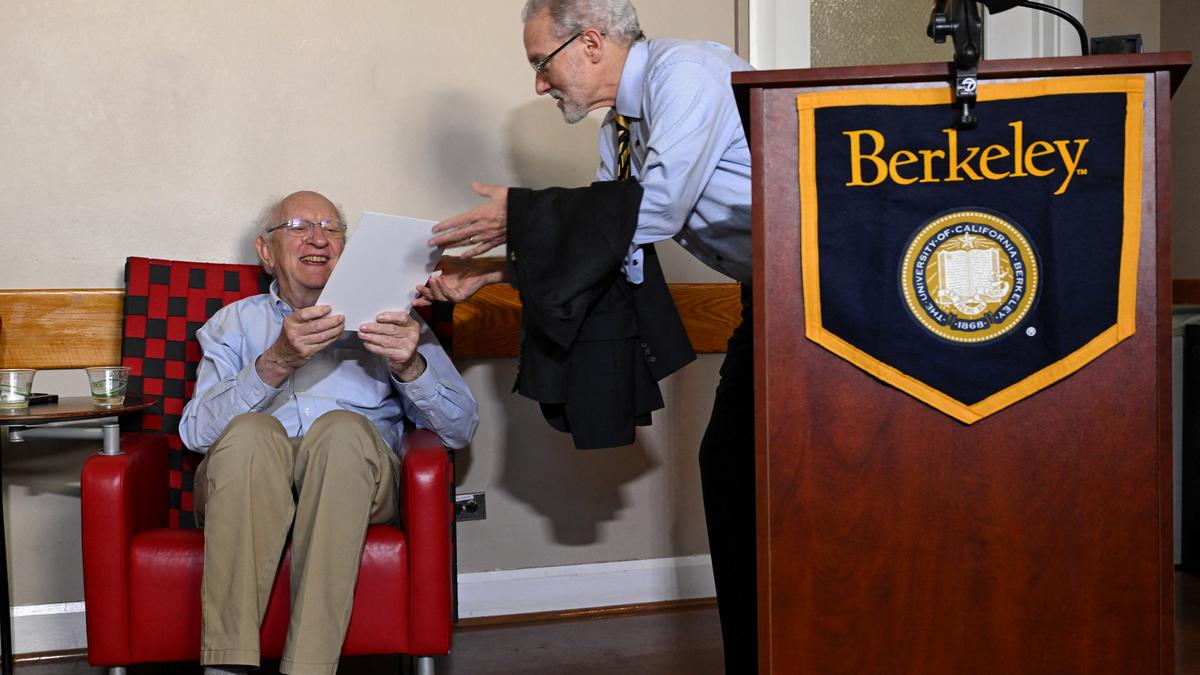Rich Lyons (right), chancellor of the University of California, Berkeley, hands a lifetime parking pass to John Clarke, an Emeritus Professor of Physics who won the 2025 Nobel Prize in Physics on October 7, 2025.
| Photo Credit: AFP
The Nobel Prizes were announced this week. They have become a fixture of my professional life. Each of the science prizes is awarded for a scientific breakthrough that changed the world. Almost always, these breakthroughs have involved some clever thinking by a scientist or two, and communicating that cleverness and the fact that it is always rooted in curiosity, rather than its practical value, has for me been a great joy. Writing about the prizes has in effect allowed me to express my own cleverness (such as it is) because there’s a lot of room and license to be creative.
The science Nobel Prizes also importantly create and hold, for three days in a year, an enormous global appetite for communicating science that would on any other day be considered too obscure. It is thus tempting to dive in and make the most of that chance. The science is sound and the Nobel Foundation’s press releases and outreach efforts make for resourceful gateways into understanding the way successful scientists think and work, what materials they need, what challenges they must overcome, and so on.
Of late, however, I’ve also been discomfited by engaging with the Nobel Prize announcements on such cheerful terms. Some time ago, before I joined The Hindu, I spent a few years researching the prizes and engaging critically with their character and interaction with the ‘rest of the world’. I wrote many articles raging against the injustices the prizes were embedded in as well as helped to perpetrate. Just the fact that they are awarded only to up to three people at a time (and to none posthumously) paints a distorted picture of how we know science is done: drawing on the work of many people operating in collaboration, including indirectly — but nonetheless crucially — on those people who care for scientists and make sure they can focus on science.
Even when some scientific work is celebrated before winning a prize because it has already yielded considerable benefits to society, the awards still provide an enormous amount of social validation. This was exemplified by recent prizes for developing the physics of machine learning and laying the foundations of mRNA vaccines, which further elevated the public profiles of Geoffrey Hinton and Katalin Karikó, respectively. Yet the prizes themselves are biased towards research that is already highly visible. They don’t recognise and help overcome the systemic barriers that keep good but less visible research from benefiting more people, and they heap more privileges on those who are already very privileged.
Every year when the prizes are announced, it has been a little embarrassing to have to cover them as a journalist. Their current structure doesn’t do science any favours but in fact perpetuates biases that many scholars and teachers are today working hard to overcome. In addition to the aforementioned issues, this includes restricting what counts as “world-changing” science to that published in “high impact” western journals, led by scientists affiliated with well-heeled European or North American institutes, and framed within the disciplinary traditions dominant in these regions. Low-cost science meets few of these criteria, yet is just as laudable.
Then again, their own prestige has meant the prize announcements must be covered — and the outreach materials and the public interest they generate provide strong incentives for a science journalist. This creates a dilemma not unlike reporting on a public figure who has said something stupid in public: do you spread the word and raise awareness or do you not give them a platform? Ultimately, I think I must admit that it is possible for something to have two disparate identities at once, to be worthy of celebration as well as censure. If I don’t make this adjustment, I will either be a lazy hypocrite or an incurable grump.
Published – October 10, 2025 01:09 am IST
